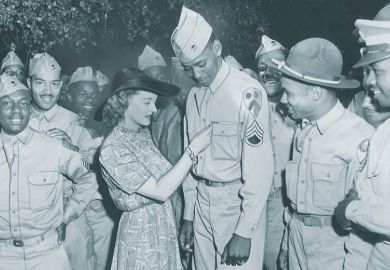The novelist William McIlvanney tells of an occasion when he was lecturing at a village hall in Scotland. In the interval a man came up to him and introduced himself, saying carefully: "I am a small admirer of your work." When it comes to Steven Spielberg, I, too, am a small admirer. But he is a phenomenon. If Spielberg did not exist, Hollywood would have had to invent him. His is the kind of fantastic, heart-warming story they love to tell. Like the goddess Athene, he sprang into the world fully armed and with a great shout, spreading good news. Crafting films that move and thrill, sharing his wonderment, speaking directly to the child that is in us all and, on the way, making a lot of money for the studios and for himself. He has done all this without causing any great offence, taking to heart Sam Goldwyn's advice that if you have a message "send it by Western Union". That's the story.
The facts, as Joseph McBride's and Andrew Yule's biographies show, are a little different. Any biographer would look for insights and clues in his subject's childhood. More so in the case of a film-maker who has so sought to dramatise the fantasies of children and who has said that he can "always trace a movie idea back to childhood". McBride and Yule are on the same track, discovering the same story and interviewing the same people.
Spielberg was born into a Cincinnati suburban home. The family later moved to Arizona. Steve was something of a loner and did not fit in. He took to 8mm movie-making with obsessive zeal because it was "my escape". His mother, Leah, the zany, creative one who played music, and Arnold, the scientist father, aided and abetted his obsession. He corralled his parents, his three younger sisters, friends and others into making his films. He tamed a school bully by casting him in one of his home movies and learned that "film was power". He developed into a skilful choreographer, an instinctive editor and was technically inventive:for instance, he blew cigarette smoke into the lens to simulate a fade out and put the camera on a skateboard for tracking.
McBride's is the better-written account but he has the more indulgent editor. There are 134 pages on Spielberg's childhood and adolescence with quotes, it seems, from everybody who ever knew him about how nerdy, wimpy, wacky, regular, popular with girls, close to Mom, close to Dad, intelligent etc, he was. McBride is fascinated by these repetitive and often banal details. But then he does think that Spielberg is a genius.
The writers easily track down scenes and themes from Spielberg's childhood in his films. There are so many direct quotes and hints from Spielberg himself that it is as if Charles Foster Kane plonked the sled in the middle of his bedroom before he died. (In fact, Spielberg bought Rosebud for $60,500 - Orson Welles later teased him that it was a fake.) There is the shower of meteors that his father took him to see (Close Encounters of the Third Kind); the home that was transformed into a working film studio, with the constant building and striking of sets (Close Encounters again); the lonely boy who tried to cope with the pain of his parents' divorce (E.T.); the prankster who scared his sisters out of their wits (Gremlins); the passion for aeroplanes (Empire of the Sun); and the anti-Semitism and bullying that he encountered, particularly as a teenager in Saratoga (Schindler's List). And there is the telling and sympathetic portrayal of American suburban life in so many of his films ("I never mock suburbia. My life comes from there.") So what is Spielberg hiding? Is there less than meets the eye or is he simply blessed with acute self-knowledge? It is certainly not stuff that came out on the psychiatrist's couch, though he did have psychotherapy ("bull**** sessions") and regaled the therapist with stories. Or are these fragments and inspirations from life proof that he is more than a prodigious craftsman and consummate entertainer but also an artist and an auteur? I think there is a confusion here between the personal and the private. An artist's personal view of the world is entangled in his style. Whatever story he tells, something of that view emerges. Sometimes there are thematic consistencies, but direct references to private life are not necessary. John Ford was never a cowboy, Kurosawa was never a samurai and Satyajit Ray never lived in a Bengali village.
What then is hidden from Spielberg himself that might have slipped through in his films? Not much. He seems conscious of the underlying theme in many of his films: the fascination with what others out there - the aliens (or Aliens) - are like. Are they vicious and out to get us? Or are they benign and we are out to get them? Or is it more complicated? Spielberg says that being an outsider - a Jewish boy in a Wasp society - marked his view of the world. Many of his childhood friends, both Jews and Wasps, dispute that there was any serious anti-Semitism in Arizona or Saratoga. But it is what he felt. One does not have to belong to an ethnic minority to feel alienated, but it helps. From Duel and Jaws to Close Encounters and E.T., Spielberg moved from believing that the enemy was out there to the belief that he/it may be closer at hand. In Empire of the Sun and Schindler's List he tried - unsuccessfully, in my view - to understand the enemy.
There are of course other films, including the Indiana Jones movies. He has said: "I've never based a decision on money". So what possessed him and George Lucas to make these films? OK, they are meant as distractions, but why the racial stereotypes? The portrayal of Arabs, Indians, South Americans and Chinese is mindless. The Japanese in Empire of the Sun are more complex. Maybe he admired their skill at war and technology.
It is not surprising to find that Spielberg, the outsider, modelled himself not on American film-makers but on two British directors, David Lean and Alfred Hitchcock. In Lean's case Spielberg mentions The Bridge on the River Kwai and Lawrence of Arabia, films made during what might be called Lean's Red Giant stage, when a star is at its most inflated, most spectacular and least stable and energetic. Hitchcock he calls Master. This raises an issue about something that Spielberg has often been accused of - manipulation. Was not Hitchcock the arch-manipulator? I think not. Hitchcock played with the audience. Audiences always knew that there was something larky afoot and were thrilled by his tricks to outfox them. Sometimes the game turned evil but it was still a game. What else can you call it when Hitchcock invites the audience to keep an eye out for his appearance? On the other hand, Spielberg sometimes plays on the audience's fears and vulnerability. That is manipulation.
Spielberg shares with Hitchcock and Lean an extraordinary grasp of craft. Unlike Francis Coppola, George Lucas and Martin Scorsese, Spielberg did not go to film school. He taught himself. When he made his first significant film, in 1968, on 35mm - a dramatic short called Amblin' - he had been making films for some 11 years and was, in a real sense, a hardened professional. Amblin' won many prizes and was his calling card to Hollywood. And it involved him in the first of three serious controversies in his career. McBride deals with these events in a sympathetic way, while Yule is more critical.
Amblin' was produced and financed by a young entrepreneur in his mid-twenties called Denis Hoffman. Yule describes the contract between them: "In exchange for production facilities and financing (of Amblin') ... Spielberg would undertake a feature of Hoffman's choosing within ten years, for a fee of $25,000, plus 5 per cent of the profits." When, after the success of Jaws, Hoffman wanted Spielberg to make a film for him, matters went into the hands of Spielberg's attorney who said that the contract was not enforceable as Spielberg was under 21 when he signed it in September 1968. Hoffman settled for $30,000. However, after some digging, Yule contends that he located Spielberg's birth certificate and that Spielberg was over 21 when he signed the contract. It is an engaging foible of Spielberg's that, when he speaks of his early days, he tends to shave a year or two off his actual age; McBride is constantly correcting. I suspect Spielberg thinks that Wunderkind is not an apt epithet - in his mind he was a Wunderkleinkind.
The tragic deaths of the actor Vic Morrow and two Asian children aged seven and six during the making of Twilight Zone - The Movie, is, according to Yule, a subject Spielberg will not discuss. He was the producer but nowhere near the accident when it happened. A charge against director John Landis and two others for involuntary manslaughter was dismissed. Yule raises a question about the fact that although the children were employed illegally - they worked outside daylight hours - Spielberg, the producer, was never summoned as a witness. The whole affair still casts a shadow.
After E.T. came out there were two allegations of plagiarism. One by playwright Lisa Litchfield, who filed an unsuccessful $750 million lawsuit, and one by Satyajit Ray, who alleged that E.T. was plagiarised from his unproduced screenplay, The Alien. McBride, uncharacteristically brief, dismisses the matter in a short paragraph. Yule is more forthcoming. But one has to refer to Andrew Robinson's biography of Satyajit Ray, The Inner Eye, to get at the essential facts.
Ray had written the first draft of the screenplay early in 1967. His hopes that the film would be financed had been raised by a friend of Arthur C. Clarkes, Mike Wilson. Ray and Wilson took the script to Hollywood. Later, Columbia UK paid an advance for the script and Peter Sellers was also keenly involved. Ray's Alien is a small humanoid whose spaceship splashes down in a pond in a Bengali village far from the metropolis. He befriends a ten-year-old boy called Haba and gets up to all sorts of mischief: "In a series of fantastically quick, short steps over the lotus leaves, the Alien reaches the shore of the pond. He looks down at the grass, examines the blade and is off hopping into the bamboo grove. There the Alien sees a small plant. His eyes light up with a yellow light. He passes his hand over the plant, and flowers come out. A thin, soft high-pitched laugh shows the Alien is pleased."
As Robinson says, "E.T....,which began life as a Columbia project, has much in common with Ray's concept". Spielberg and Ray also have in common a deep interest in a child's view of the world and both are wonderful directors of children. But whereas Ray's children confront reality - in The World of Apu, five-year-old Kajal throws a stone at the man he has never met who tells him he is his father - Spielberg's children escape into fantasy. Whatever the arguments over the origin of the script, E.T. is quintessential Spielberg.
Like most children who are different, Spielberg tried to blend in: "I wanted to be a gentile with the same intensity that I wanted to be a film-maker." Schindler's List was a defiant admission of his roots. Both writers see it as a turning point, where Spielberg put away childish things. But he remained, nonetheless, the same person who directed all his other films, with the same virtues and shortcomings.
The opening of Schindler's List, with the lighting of the candles, the prayer and the dying of the light could not be simpler or more poetic. Next is a bitter scene at the railway station, where we see the petty details of the bureaucracy of terror - trestle tables, ink pots, pens, typewriters and paper - and the victims who blithely announce their names, unaware that it is for a death list.
The introduction of Schindler himself is from a different director. Spielberg focuses on his possessions: cuff links, shirt, tie, money and Nazi pin. This is an echo of the earlier cluster of close-ups, in context a tired teleplay idea. We follow Schindler into a tacky club frequented by Nazi officers and their women. We are invited to look through Schindler's eyes, but we have no idea what is behind the eyes. What follows is a clumsy, lugubrious scene establishing corruption, decadence and arrogance. And, as happens when Spielberg is unsure or lost, there is a lot of well-crafted topspin. But we are on the outside, and we stay there throughout as far as Schindler is concerned. We are given details, but they do not add up. There are characteristics but no character; Schindler's motives are opaque. Spielberg responded to this line of criticism by condemning "American audiences, who demand easy answers to complicated questions". This from a man who has also said: "We should deliver what they think they are going to see". In any case, in Schindler he seesaws between insight and blurred vision. What helps the film is the portrait of Itzhak Stern and Ben Kingsley's performance. Why Spielberg did not have Stern as the central character, twisting and turning, coping heroically with the Nazis and Schindler, I do not know. As made, the film is broken backed.
McBride believes that Schindler is a portent of Spielberg's mature stage. Yule is less sure but fears that, with the creation of Dreamworks, the first new Hollywood major for 50 years, Spielberg may become too powerful for his own or anybody else's good. He has become more of a corporation than a film-maker. But he is only 50: there is a way to go. The definitive biography has yet to be written.
Mamoun Hassan conceived and produced Movie Masterclass for Channel Four.
Steven Spielberg: Father of the Man
Author - Andrew Yule
ISBN - 0 316 91363 4
Publisher - Little, Brown
Price - £16.99
Pages - 395
Register to continue
Why register?
- Registration is free and only takes a moment
- Once registered, you can read 3 articles a month
- Sign up for our newsletter
Subscribe
Or subscribe for unlimited access to:
- Unlimited access to news, views, insights & reviews
- Digital editions
- Digital access to THE’s university and college rankings analysis
Already registered or a current subscriber? Login



